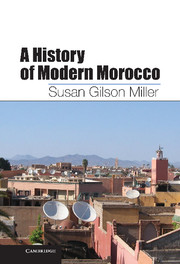Book contents
- Frontmatter
- Contents
- List of Maps and Illustrations
- Acknowledgments
- Note on Transliteration and Translation
- Chronology
- Who Is Who?
- Introduction
- 1 The Closing of the Era of Jihad (1830–1860)
- 2 Facing the Challenges of Reform (1860–1894)
- 3 The Passing of the Old Makhzan (1894–1912)
- 4 France and Spain in Morocco
- 5 Framing the Nation (1930–1961)
- 6 The First Age of Hassan II
- 7 The Second Age of Hassan II
- 8 Summation
- 9 Postscript
- Key Abbreviations
- Glossary
- French Rsidents-Généraux in Morocco, 1912–1956
- Sultans and Kings of the ʿAlawite Dynasty, 1664–2012
- Notes
- Bibliography of Works Cited
- Index
1 - The Closing of the Era of Jihad (1830–1860)
Published online by Cambridge University Press: 05 February 2013
- Frontmatter
- Contents
- List of Maps and Illustrations
- Acknowledgments
- Note on Transliteration and Translation
- Chronology
- Who Is Who?
- Introduction
- 1 The Closing of the Era of Jihad (1830–1860)
- 2 Facing the Challenges of Reform (1860–1894)
- 3 The Passing of the Old Makhzan (1894–1912)
- 4 France and Spain in Morocco
- 5 Framing the Nation (1930–1961)
- 6 The First Age of Hassan II
- 7 The Second Age of Hassan II
- 8 Summation
- 9 Postscript
- Key Abbreviations
- Glossary
- French Rsidents-Généraux in Morocco, 1912–1956
- Sultans and Kings of the ʿAlawite Dynasty, 1664–2012
- Notes
- Bibliography of Works Cited
- Index
Summary
In 1830, Morocco found itself under attack by an assertive and expansive Europe, in the shape of France’s massive and well-planned attack on the city of Algiers. With this event, Morocco was ineluctably drawn into an economic and political maelstrom that would absorb its energies and color its outlook for years to come. Europe for Morocco was a familiar adversary. Morocco had lived in Europe’s shadow for centuries, sometimes amicably, at other times in a state of violent confrontation. Their histories were intertwined due to proximity and political necessity. Traders from Marseilles set up a funduq (merchants’ inn) in Ceuta in 1236; in the fifteenth century Jews banished from Iberia after centuries of settlement found a safe haven in Fez; and in the seventeenth century, Moriscos – Muslims who had adopted Catholicism but were forced to leave Spain by the Inquisition – transformed Morocco’s maritime economy into a corsairing one, returning the confrontation with the Christian West to Europe’s shores. From the mid-eighteenth century onward, Europe’s slow and steady march toward what historians call “modernity,” meaning greater degrees of state integration, capitalist development, and technological progress, inevitably shaped its attitudes and actions toward Morocco. Meanwhile, Morocco responded by adopting ploys and stratagems that it hoped would mitigate foreign influence and allow it to preserve its independence.
The year 1830 marks the beginning of a transition to a new phase in which Europe is no longer an intermittent factor in Moroccan affairs, but an omnipresent reality looming over political events, the economy, and even social life. Yet, at the same time, the European factor was not all-determining; other salient features of Morocco’s interior landscape continued to evolve, change and confront one another, testing the capacity of the state to meet challenges at home and abroad. Factors that moved quite independently of the European encounter remained in play, such as the struggle for quotidian existence against the forces of nature, changes in intellectual life, the tension between the sultanate and the ruling classes, and the arrival of new ideas from the Muslim East that swept over society.
- Type
- Chapter
- Information
- A History of Modern Morocco , pp. 7 - 27Publisher: Cambridge University PressPrint publication year: 2013



